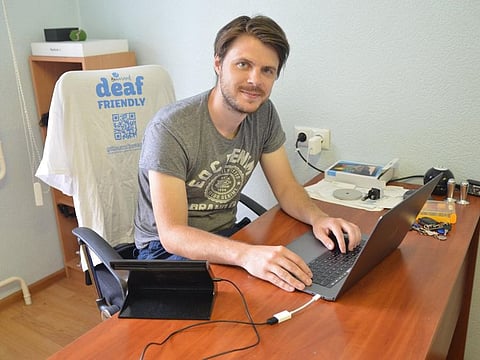Deaf Ukranian expat in UAE co-founds real-time sign language interpretation service online
App empowers residents to summon expert virtually who can bridge any communication gap

Dubai: The deaf community in the UAE is spearheading initiatives for its members to seamlessly navigate the online world where they face considerable challenges.
According to the Ministry of Community Development database, as of last February, about 3,065 people of determination are with “hearing disabilities” of Emiratis and residents.
Ukranian expat Vitalii Potapchuk, who was born deaf, and faced a number of challenges, has co-founded an app – a solution to the many problems that deaf people face.
“We have come up with an app called Amsaan, that allows deaf individuals to easily communicate their needs and preferences without relying on notes or facing humiliation of not being able to convey the right message,” he said.
“As an example, imagine a deaf person in a restaurant who wants to inform the waiter about a nut allergy. One option is writing down his concerns and sharing it with the staff of the restaurant. But not everyone maybe fluent in a particular language. The app on the other hand allows a seamless conversation to happen. At the click of a QR code, the deaf individual is connected to a sign language interpreter for the seamless conversation,” said Potapchuk.
He added that the QR code also converts static information into sign language videos, making it accessible at museums, libraries, and various other locations.
Struggling at a young age
“While I was in university, I faced a big challenge when attending lectures because I needed a live interpreter. Here an idea stemmed to create a video relay service that would let me access interpretation services online, without needing a physical interpreter.”
The bigger need was to improve communication accessibility for the deaf community.
How to make calls via the app
Potapchuk put up another scenario - making phone calls, which we take for granted. “This may seem like a simple thing but it is a huge challenge for deaf people. Thanks to the app, they can now call an interpreter, dictate the number they wish to call, and have their challenges resolved," he said.
Potapchuk said that one major issue faced by deaf people is the lack of proper subtitles in videos and multimedia materials on online content. Subtitles provide a written version of the spoken content, allowing deaf individuals to understand what’s being said in videos. Without subtitles, users with hearing impairment miss out on all the information conveyed through audio.
“Online communication platforms lack real-time sign language interpretation options. Sign language is crucial for us and without interpreters in virtual meetings, video calls, they may struggle to participate in important discussions.”
He added: “Another issue is podcasts and audio content that don’t provide transcripts. The list goes on."
Need to promote sign language
Majed Murad Mazer Al Bloushi, a 28-year-old Comoros expat who was born and raised in Al Ain, is grateful for this app. Bloushi, who was born deaf (as were his two older brothers), said: “Throughout my childhood, I faced significant challenges as I attended mainstream school. Without access to an interpreter to explain the lessons to me, it was difficult to learn my lessons. Fortunately, times have changed, and now there are schools for the deaf, reflecting a positive shift towards greater inclusivity and accessibility.”
Bloushi added: ‘My experiences have taught me the vital importance of promoting sign language awareness throughout society. Sign language is not just a tool of communication for the deaf community; it’s a bridge that connects them with the world.
"To truly empower deaf people in the UAE, a collective effort is needed to ensure that everyone has at least a basic understanding of sign language. This would immensely enhance communication and foster a more inclusive environment.”
Bloushi was elated to be hired as Relationship Manager at Amsaan Project. “It keeps me close to my passion to help people with hearing disabilities.”
By 2050, nearly 2.5 billion people are projected to have some degree of hearing loss and at least 700 million will require hearing rehabilitation. Over 1 billion young adults are at risk of permanent, avoidable hearing loss due to unsafe listening practices.
Sign up for the Daily Briefing
Get the latest news and updates straight to your inbox








